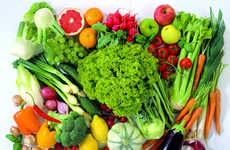
University of New Hampshire Course Will Go From Farm to Fork
Marissa Brassfield — February 10, 2009 — Eco
References: unh.edu & treehugger
The University of New Hampshire's vanguard EcoGastronomy Program nourishes the minds of environmentally-conscious students who are passionate about sustainable food practices. Part of the curriculum involves visiting farms and working within greenhouses, but the apex of the major is a trip to the University of Gastronomical Sciences in Italy.
Courses offered within the EcoGastronomy Program at the University of New Hampshire include "Sustainable Food Production," "Nutrition in Health and Well Being" and "Food and Society." I can't think of a better way to foster interest in local, organic food and simultaneously inspire more widespread sustainable farming practices.
Courses offered within the EcoGastronomy Program at the University of New Hampshire include "Sustainable Food Production," "Nutrition in Health and Well Being" and "Food and Society." I can't think of a better way to foster interest in local, organic food and simultaneously inspire more widespread sustainable farming practices.
Trend Themes
1. Ecogastronomy Education Programs - As more universities adopt eco-friendly practices, innovative educational programs in sustainable food production and environmental management are emerging.
2. Sustainable Agriculture - As awareness grows about the negative impact of industrial agriculture, innovation in sustainable farming practices like food waste reduction, soil health management, and energy-efficient technologies continues to expand.
3. Farm-to-table Movement - As consumers demand greater transparency and local sourcing in their food supply, there is an opportunity for businesses to invest in sustainable agriculture and distribution networks to support the farm-to-table movement.
Industry Implications
1. Higher Education - Educational institutions can invest in eco-gastronomy and sustainable agriculture programs to educate the next generation of environmentally-concerned leaders and entrepreneurs.
2. Food Production and Distribution - Businesses in the food industry can invest in sustainable agriculture and distribution networks to meet the growing demand for locally-sourced and environmentally-friendly food products.
3. Environmental Management - As companies and governments look to improve their environmental impact, professionals with expertise in sustainable agriculture and food systems can bring valuable knowledge and insights to develop and implement effective strategies.
2.2
Score
Popularity
Activity
Freshness























